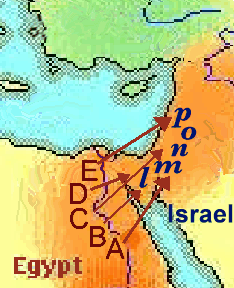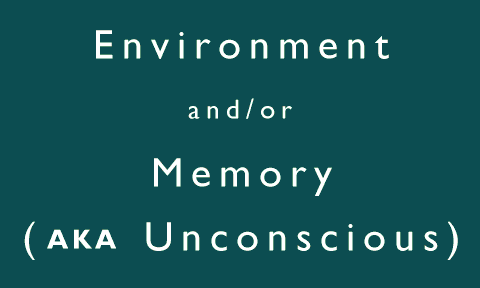upon
CHRISTIANITY
The revelation of the Dead Sea
Scrolls,
the Gnostic Library and
Egyptology
after Ahmed Osman
by William Theaux
Based on the 20th century findings in Archeology,
Ahmed Osman suggests the strong
probability that
several characters of the Old Testament
are related duplicates to a repressed part of Egyptian
history

Pic.10 : The vizir Yuya in Egypt
and specific deeds or projects of several Pharaohs
would been pictured into Hebrew heroes
According to William Theaux
If this view is
correct,
it would remarkably support
the Model of the Unconscious
as it is proposed by Psychoanalysis
{the animation may take time to load}

Pic.20 : After the failure of a political project [A,B,C,..],
known as Atonism in Egypt, the Hebrew Monotheism continues
to carry [l,
m,
n,..]
the repressed memory after the pact of Quades
[Q]
while it is animated by the Significand of the Taboo
[![]() ] - and History
begins.
] - and History
begins.
(see more detailed explanation of the schema)
T h e D E B A T E :
At the end of the repressed series
in Egypt, Ahmed Osman sees
the possible figure for a correlated hero in the New Testament (Jesus);
hence he writes that Jesus Chirst was but an icon.
Yet Ahmed Osman neglected the Taboo phenomenon
With a more advanced theory
which includes Greece in history,
William Theaux claims that he unlocks the last key
left in place with Osman and he suggests that
Jesus Christ was a living character in the face of
Repression.
NOTE : Ahmed Osman is the
Egyptologist and Historian who has gathered, in one comprehensive model,
the three fundamentals discoveries of Archeology (Dead Sead Scroll - Nag
Hammadi Gnostic Library - Egyptology of the 18th Dynasty). It is a monumetal
achievement of the 20th century outlook in an essential moment of its
civilization, and it opens to controversial revelations.
Click on the pic to read A.Osman's
summaries :

William Theaux is a psychiatrist and the first Socioanalyst who has
resumed Freud's attempt to interpreting the origins of Monotheism. He published
his work in France several years ago and is showing today how Osman's discovery
confirms his work - and also asks for another step, in order to undestand
the full process of historization that Christianity represents.
Click on the pic to read W.Theaux
summaries :

NOTE : description of
PIC.20 :
![]() Recovering after
an invasion which could have caused the extinction of its civilization, the
18th Dynasty restored the power of Egypt into an Empire that extended beyond
the Arabian Isthmus, up and into Babylonia, and at the door of the Aegean
sea (contemporary Turkey). If Egypt, then, wanted to prevent another collapse,
it had to implement a new social system, and transform its organization,
if not the mentalities, of this compound of tribes and many old kingdoms.
Recovering after
an invasion which could have caused the extinction of its civilization, the
18th Dynasty restored the power of Egypt into an Empire that extended beyond
the Arabian Isthmus, up and into Babylonia, and at the door of the Aegean
sea (contemporary Turkey). If Egypt, then, wanted to prevent another collapse,
it had to implement a new social system, and transform its organization,
if not the mentalities, of this compound of tribes and many old kingdoms.
![]() This situation
was comparable of what was, much later, the Renaissance 1500 A.D., when the
Mediterranean word extended and included the Americas ; around 1400 B.C.
in Egypt, the world was opening likewise to a new horizon. In spite of an
uncomplete coverage - a final unconquested piece (Hittite) - the Egyptian
politicians contemplated the Aton project, that was to give a united,
and unique, identity for the entire East Mediterranean populations. The
elaboration of this plan lasted from 1500 B.C. up to 1350 B.C and involved
seven or eight rulers
[A, B, C,
D, E... on the graph].
This situation
was comparable of what was, much later, the Renaissance 1500 A.D., when the
Mediterranean word extended and included the Americas ; around 1400 B.C.
in Egypt, the world was opening likewise to a new horizon. In spite of an
uncomplete coverage - a final unconquested piece (Hittite) - the Egyptian
politicians contemplated the Aton project, that was to give a united,
and unique, identity for the entire East Mediterranean populations. The
elaboration of this plan lasted from 1500 B.C. up to 1350 B.C and involved
seven or eight rulers
[A, B, C,
D, E... on the graph].
![]() In 1300 B.C.,
the failure of the Aton project was declared and a new set of politicians
had to address the same international need with another plan. This was finally
established in a Negotiation at Quades [
Q
on the graph] when, and where, Ramses.2 and its partners established
an International organization instead of a united State. This
second attempt had to deal with serious incompatibilities which marked the
previous Aton difficulties. Choosing to shortcut the issue, the new
rulers agreed to simply delete from their official history all that had been
related to the Aton line. This mechanism of memory repression
[A, B, C,
D, E... turning white on graph] did not occur
without certain consequences :
In 1300 B.C.,
the failure of the Aton project was declared and a new set of politicians
had to address the same international need with another plan. This was finally
established in a Negotiation at Quades [
Q
on the graph] when, and where, Ramses.2 and its partners established
an International organization instead of a united State. This
second attempt had to deal with serious incompatibilities which marked the
previous Aton difficulties. Choosing to shortcut the issue, the new
rulers agreed to simply delete from their official history all that had been
related to the Aton line. This mechanism of memory repression
[A, B, C,
D, E... turning white on graph] did not occur
without certain consequences :
![]() The more the
facts were repressed in Egypt, the more they remained in a mirror-like fashion
(amongst the Hebrew tribes which were gaining the knowledge of writing in
the process)
[l,
m, m,
o, p... on
graph]. The Psychoanalytical theory explains that, when the setting
of the Significand of the repression occurs (Quades,
Q , meaning that the former
Atonism was deleted), the Primary Significands organize and develop
into a text [lmnopq..,
mnopqr.., nopqrs..,
opqrst.., pqrstu...
on graph], which can later be seen as a material part of the
Unconscious. The efflorescent production of Letters, sometimes understood
as organized in a magical way (Kabala), which
was represented with the monumental Sacred Scripture, has also been accompanied
- always according to the Psychoanalytical Theory
- by a factor which complements the repressed meaning of
Q ; it is found in th Oedipus
Complex as the Phallus [
The more the
facts were repressed in Egypt, the more they remained in a mirror-like fashion
(amongst the Hebrew tribes which were gaining the knowledge of writing in
the process)
[l,
m, m,
o, p... on
graph]. The Psychoanalytical theory explains that, when the setting
of the Significand of the repression occurs (Quades,
Q , meaning that the former
Atonism was deleted), the Primary Significands organize and develop
into a text [lmnopq..,
mnopqr.., nopqrs..,
opqrst.., pqrstu...
on graph], which can later be seen as a material part of the
Unconscious. The efflorescent production of Letters, sometimes understood
as organized in a magical way (Kabala), which
was represented with the monumental Sacred Scripture, has also been accompanied
- always according to the Psychoanalytical Theory
- by a factor which complements the repressed meaning of
Q ; it is found in th Oedipus
Complex as the Phallus [
![]() on
the graph] . <Back to Pic.>
on
the graph] . <Back to Pic.>
© William Theaux 1949-1999